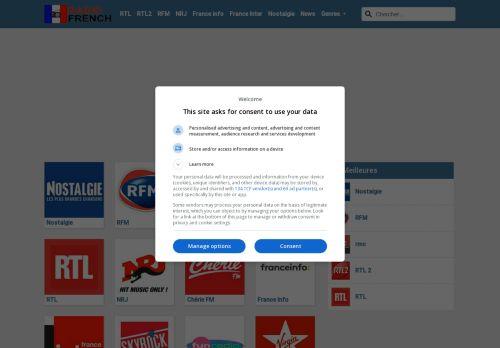
About Radiofrench.fr
This company does not currently have a business account, if you are the owner of the company, you can open a business account immediately.
Site Information
Is this your company?
Claim your profile to access Trustedreviews free business tools and start getting closer to your customers today!
About TrustedReviews
We Fight Fake Reviews
Here’s how you can flag problematic reviews.
We improve experiences
Here's our commitment to you.
We encourage quality customer feedback
We are check comments and we care about data reliability
Business Transparency
Claiming a profile allows the company to do things like reply to reviews, invite customers to write reviews,
Dear users; You can find all kinds of information about TrustedReviews in the faq section.
Radio has evolved a great deal since the days of radiodiffusion. Today, it is a popular medium for entertainment, and its reach has expanded to meet the needs of modern consumers and generations. As one of the top entertainment sources available to modern clients, #RadioFrench has become a powerful tool in this evolution. Here are just a few benefits of radio en ligne. They include: a large audience - 4,4 billion people on the Internet.
Digital Formats - Radio France's online presence has expanded over the past few years. It produces its programs in digital formats since 2006 and offers many of them as podcasts in MP3 format. In addition, the radio station has begun producing videos from radio broadcasts that are livestreamed on its site and inserted into its video catalog. While this method is a relatively new addition to radio broadcasting, it promises to enhance the listening experience.
Free Music - RadioFrench.fr offers free music and radio ad streaming. Some stations also provide ad content in the form of podcasts. This allows users to listen to radio in the format that best suits their needs. This is especially convenient for people who have limited budgets or want to listen to music on the go.
Free Radio - While the station was initially prohibited from broadcasting politically-charged content, its content grew in popularity. Eventually, Minister Daladier introduced a new law to regulate radio stations and set up censorship to establish a monopoly on broadcasting. The radio station became popular and was home to many popular songs that boosted morale and spirit among its listeners. Another popular station was Radio-Jeunesse, which broadcast songs that promoted family unity of spirit.
During World War II, radio gained great political power. In 1936, about 4 million people in France had access to a radio. The country's three major stations were Tour-Eiffel, Paris-PTT, and Radio-Paris, but smaller stations were also available. After the Armistice, the Vichy regime took control of the southern and northern stations. Radio-Londres, meanwhile, broadcasted from London. The resulting political climate allowed for wartime songs to flourish.
Private radio stations were also allowed to broadcast in France, allowing them to be heard across the country. From 1981 to 2002, RTL was the most popular radio network in France. Its English service tended to be popular music and light entertainment. Today, it is a mixed station with a large staff of respected journalists. This makes it a great choice for those who wish to listen to radio in their native language.
SLER started broadcasting in Luxembourg in 1930 after a contract was signed between the Luxembourg government and the SLER. The agreement lasted for 25 years and guaranteed the government a fee of 30% of the station's future profits. The agreement also established a technical and programming committee to regulate the station.
Previously, the Radio France team was using both Jenkins and GitLab for their code management. They had been constantly switching between the two tools due to configuration issues. They wanted to merge the two technologies to reduce the friction and avoid constant context switching. They also wanted to have better control over code management and deployment. Jenkins had many issues and the development team wanted to manage them more easily.